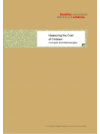This Families Commission report reviews some of the main concepts and methodologies in the cost of children literature. It does not attempt to arrive at cost estimations.
It is well known that it takes a substantial amount of both time and money to raise children. It is also known that the amount of time and money that parents invest in their children has some impact on the developmental outcomes for children.
Child poverty is associated with a number of negative child outcomes – which often persist once the child has become an adult. Because of this, the amount of time and money put into raising children is of interest in many areas of policy, including child poverty, benefit rates, child support payments and health and education subsidies.
Cost measures range from the costs faced by parents (including opportunity costs), the costs faced by supporting family members and communities, and the costs of government contributions. The concept and methodology used to calculate the cost of children depend heavily on the purpose of estimation. An estimate of the minimum amount needed to raise a child at a socially acceptable standard of living will be substantially different to an estimate of the average expenditure of parents on children.
Purpose
This report provides a summary of cost of children concepts and methodologies, with a primary focus on methodologies that estimate the direct parental costs. It is not exhaustive in its discussions of issues associated with such costs. This paper should be used only as a summary, and readers interested in calculating an estimate of the cost of children are encouraged to refer to the referenced papers for greater depth and detail.

